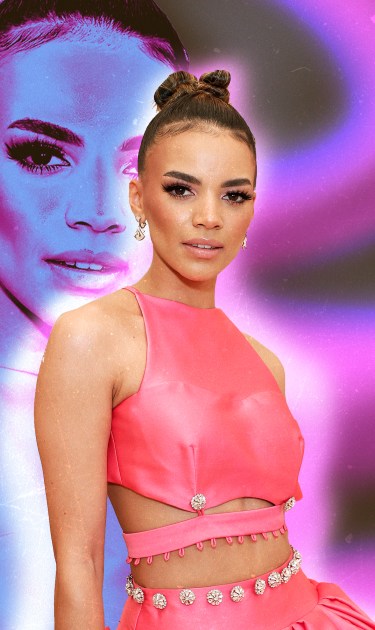Back in 2012, Dominican-American triple threat Leslie Grace burst onto the mainstream scene with her bilingual-bachata rendition of “Will You Still Love Me Tomorrow” by The Shirelles. The 1960s hit earned the singer 20 weeks on the Billboard charts and she was quickly dubbed the Princess of Bachata. But a lot has changed in her career since we first met her at 17. She stopped doing bachata, for one.
The last few years have seen Leslie collaborate with some of the biggest names in Latine pop and el movimiento like Becky G, Farina, CNCO, and Karol G. She even made her big-screen debut in the film adaptation of the Broadway classic musical In The Heights and will be starring in the upcoming Batgirl movie as Batichica herself Barbara Gordon. Being an all-rounding performer was something that the “Duro y Suave” singer envisioned since she was very young. “When I was a kid, I just loved performing. I never separated those things, whether it was acting or dancing or singing, it all felt like parts of a whole for me,” she tells Remezcla over Zoom call.
But back in September, Leslie went back to her roots with the release of “Bachatica.” The romantic trap-infused danceable bop has been killing it in the dance community on TikTok and Instagram created by dancers everywhere. As the Spanglish population grows, it’s clear that we’re headed to a future where the lines that divide musical genres and even languages are no more, and Leslie Grace is ahead of the game.
Remezcla chatted with Leslie Grace about her newest single “Bachatica,” her new acting endeavors, fellow Dominicana Tokischa, and what her parents think about her more sensual tracks.

Tell me about “Bachatica” and how did it come about?
“Bachatica” is a song that is super special to me. It came about with two of my very good friends who are incredibly talented, Maye and Musiana. They’re two singer-songwriters who I love. This is actually the first song that I wrote with two women. The three of us just really connected and became friends right after that. [It was] really organic, we found something really special, and the synergy was felt immediately. But they started this song at Maya’s house… and this melody came about. Maya was playing some chords that were just really romantic and almost inspired by old boleros of the golden age, like Celia and La Lupe. They knew I’d been looking for a very long time for a romantic bachata because I hadn’t released one basically since the beginning of my career. So the idea for “Bachatica” started to come together. They didn’t finish it, they were just like, “Let’s just get the mold of it and voice note it and show Leslie tomorrow and if she likes it, we’ll finish it with her.” And as soon as the first 30 seconds of that voice note that I heard off the iPhone, I knew that this was my song. That we had to finish it today.
It really shocked me to hear snares in the kicks of a Bachata song. Whose idea was it to add the snares?

We knew it fit perfectly in a BPM where we could use some trap elements. Once we went into production we spent some time trying to find a producer that would get the mix of those sounds and fuse them both in a balanced way. And so Eddy Perez, a Dominican producer, he experimented with the song a little bit and sent us a couple of different versions. We went back and forth on the level of how much we wanted the kick to feel like an R&B record, but also the snare to be in there going into the second verse to feel like it was a little bit of that trap element.
It was refreshing to hear!
That was exactly the reaction that we wanted! My goal is always to represent classic ideas in a new way. So that was our way of fusing and recreating a classic bolero structure song that could normally be a ballad and then make it danceable but also make it feel modern.

I feel like it connects with the Spanglish of us. The ones that listen to trap and bachata.
Yeah, it’s our generation. It’s blurring the lines [of genre].
Musically, what artist del patio, from DR, inspires you?

I think one of the greatest del patio, for me, and he continues to be through time, Raulin Rodriguez. I think he’s really good at making songs de despecho and love. And I think that sometimes it’s really hard to find an artist that can do that in Bachata because it’s hard to write romantic songs in the genre because the genre began in burlesque in bars, in speakeasies, the cabarets. It wasn’t even allowed at a certain point. It’s beautiful for me to see and to listen to an artist that can do both, desamor and amor.
How has it been navigating this accelerated success and are you afraid of peaking?
Just like anybody that’s pursuing a dream or a career—work has been non-stop. And the next thing and the next thing, and how can I do better. How can I grow, grow, grow. Not just outwardly, but inwardly, and learn more and more how to manage the pursuit of my dream in a way that feels fulfilling. It’s been a blessing to see many things come into fruition. A lot of things that seem on the outside like overnight, the things that are happening in my acting career have been long years of a lot of seeds of sacrifice and training and time and effort. A lot of people don’t know I’ve been auditioning and training for seven years, self-taping until doing Heights. And being bad at it! And learning along the way. That’s what it takes when you pursue a craft. When you’re passionate about something you continue to pursue it until you get better and better and that never stops. Same thing in my music career. I think it has also given me the experience to, in essence, maybe skip a couple steps on the acting. And because I’ve had this experience as a public person to know a couple of things that come with that kind of exposure in a way that maybe a musical artist wouldn’t have undergone. But I think it’s beautiful to be able to now have these two sides of my artistry, and to continue to add on to the ways that I express myself as an artist in general.

“It’s been a blessing to see many things come into fruition. A lot of things that seem on the outside like overnight, the things that are happening in my acting career have been long years of a lot of seeds of sacrifice and training and time and effort.”
With all the success, of course there’s some downsides to it. What did you learn from the backlash that In the Heights received? About not getting Black representation, or dark skin tone representation. For Dominicas and Latines in general.
I learned a lot, and I think the conversation was really important. I learned that communication is everything. I also learned that you can make something with all of the best intentions, but when you’re working to create art in a space where our stories haven’t been told and you’re breaking through in a way that we haven’t been able to before, there’s always room for improvement. It’s never going to be enough until we’re all out here telling multiple stories and we’re not struggling for one seat at the table. I still believe in my heart, and I know what the process was for our film and the heart behind everyone that was involved, everybody’s heart was to represent this neighborhood as best we could and to tell a universal story through the scope of a neighborhood that we all know and love, or at least everyone that was involved knew and loved like Washington Heights. Casting was available for everyone to join and to give their best to be a part of this film, down to every dancer. And everyone that was there worked hard and deserved to be there. So we had hoped that having the opportunity to make this movie and tell this story would be a breakthrough for more stories to be told, that it wouldn’t be the only one and for more spaces to be opened up. But I think the conversation at the end that occurred from it was even more important because now people are aware. Like, “Hey, we need more spaces for Afro-Latinos, dark skin Latinos to be at the forefront.” And I think everybody involved was aware of that and by no means was there a specific exclusion.
Last question. I’ve been dying to know because I’m Dominican. I know how Dominican parents think. So I understand and have been wondering what did your parents think when they heard “Duro Suave?”
[burst out laughing] That is great! I love that honest question. Because yeah, you do have parents like, “Hold up.” But you know what? My parents are very progressive, not gonna front. They just love the music, so they were just like, “yo, we’re feeling this.” My parents have been hand-in-hand with me throughout my career, walking with me and seeing me grow. But also knowing and trusting that I would never sing anything that would make me feel uncomfortable, and that’s all they care about. This was a song that I wrote with colleagues that I felt was just a dope song and a great concept. There have been other songs along the way that have been presented to me that I felt said things in a way that I wouldn’t say. I’m not too much of a literal person, but I don’t knock it either, that’s just how I express myself. So my parents have seen me evolve in that way, and how I express my sensuality and how to feel confident in all that. And they applauded it—for real. I would tell you if they were bugging a little bit! My mom was like, “It was spicy pero I like it. Ta bueno el reggaetoncito.”
What do you think about Tokischa?
I love Toki. My mom is the first one dancing to her songs at Zumba [laughs]. She probably won’t say it, but she’s still like [does dancing motions]. Para los gustos, los colores. Yo pienso que la gente tiene su percepción de lo que es aceptable para ellos y lo que ellos dirían en su propia forma. No one would believe me saying the things that Toki says as an artist and as a person. But that’s how she self-expresses–that’s her life, and you can feel that it’s genuine. And for me, that’s the most important thing in art. That it’s credible and believable and authentic. So I’m like, “go off girl!” I love her song with Rosalía as well.




